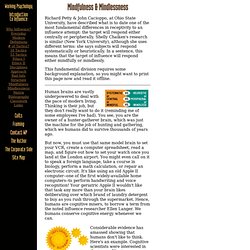

Self-improvement 1. Self-improvement 2. How Other People’s Expectations Control Us. We quickly sense how others view us and play up to these expectations.

Start-ups are all Naked in the Mirror. This is part of my ongoing series Startup Lessons Building companies is hard work.

BEHAVIOR OF YOUNG CHILDREN UNDER CONDITIONS SIMULATING ENTRAPMEN. Behavior of young children in a situation simulating entrapment in refrigerators was studied in order to develop standards for inside releasing devices, in accordance with Public Law 930 of the 84th Congress.

Using a specially designed enclosure, 201 children 2 to 5 years of age took part in tests in which six devices were used, including two developed in the course of this experiment as the result of observation of behavior. Success in escaping was dependent on the device, a child's age and size and his behavior. It was also influenced by the educational level of the parents, a higher rate of success being associated with fewer years of education attained by mother and father combined. Dan Pink on the surprising science of motivation. Understanding Others' Regret: A fMRI Study.
Previous studies showed that the understanding of others' basic emotional experiences is based on a “resonant” mechanism, i.e., on the reactivation, in the observer's brain, of the cerebral areas associated with those experiences.

The present study aimed to investigate whether the same neural mechanism is activated both when experiencing and attending complex, cognitively-generated, emotions. A gambling task and functional-Magnetic-Resonance-Imaging (fMRI) were used to test this hypothesis using regret, the negative cognitively-based emotion resulting from an unfavorable counterfactual comparison between the outcomes of chosen and discarded options. Do the same brain structures that mediate the experience of regret become active in the observation of situations eliciting regret in another individual? Figures Citation: Canessa N, Motterlini M, Di Dio C, Perani D, Scifo P, et al. (2009) Understanding Others' Regret: A fMRI Study. Yaacov Trope. Professor of Psychology Social & Cognition & Perception Visit the Trope lab.

Three Secrets to Make a Message Go Viral. Access : Thoughts of money soothe social rejection. Neuroscience Sheds New Light on Creativity - Rewiring the Creati. Caring for Your Introvert. From Atlantic Unbound: Interviews: "Introverts of the World, Unite!

" (February 14, 2006) A conversation with Jonathan Rauch, the author who—thanks to an astonishingly popular essay in the March 2003 Atlantic—may have unwittingly touched off an Introverts' Rights revolution. Follow-up: The Introversy Continues Jonathan Rauch comments on reader feedback about introvert dating—and poses a new question Do you know someone who needs hours alone every day? Who loves quiet conversations about feelings or ideas, and can give a dynamite presentation to a big audience, but seems awkward in groups and maladroit at small talk? If so, do you tell this person he is "too serious," or ask if he is okay? If you answered yes to these questions, chances are that you have an introvert on your hands—and that you aren't caring for him properly. Mindfulness & Mindlessness in Persuasion. Richard Petty & John Cacioppo, at Ohio State University, have described what is to date one of the most fundamental differences in receptivity to an influence attempt: the target will respond either centrally or peripherally.

Shelly Chaiken's research is similar (New York University), although she uses different terms: she says subjects will respond systematically or heuristically. In a sentence, this means that the target of influence will respond either mindfully or mindlessly. Bad Information About Persuasion, Compliance, & Mind Control.
"Laaa-dies & Gentlemen!

Children of all ages! Gather around and you shall learn of my fabulous concoction of maaa-gic persuasion! Command and watch people follow! Americans less happy today than 30 years ago: study. By Deepa Babington ROME Fri Jun 15, 2007 1:34pm BST ROME (Reuters Life!)

- Americans are less happy today than they were 30 years ago thanks to longer working hours and a deterioration in the quality of their relationships with friends and neighbors, according to an Italian study. Researchers presenting their work at a conference on "policies for happiness" at Italy's Siena University honed in on two major forces that boost happiness-- higher income and better social relationships -- and put a dollar value on them. How the internet is creating a generation of lonely children. By LAURA CLARK Last updated at 01:35 04 May 2007 Technology is creating a generation of lonely children who struggle to make friends, a study claims.

Youngsters spend so much time on solitary pursuits such as computer games, surfing the Internet and listening to MP3 players that they fail to develop social skills. Many find themselves isolated in the playground, according to the survey of 100 teachers. Others become anti-social and resort to bullying rather than relating properly to their peers. More than 70 per cent of teachers questioned for the study by the charity Save the Children said the long hours spent alone with technology had damaged children's ability to socialise. A third said loneliness among pupils and difficulties in making friends were becoming more common. Norris Hall shooter identified. Wired 13.02: Revenge of the Right Brain. Logical and precise, left-brain thinking gave us the Information Age. Now comes the Conceptual Age - ruled by artistry, empathy, and emotion. By Daniel H. PinkPage 1 of 2 next » When I was a kid - growing up in a middle-class family, in the middle of America, in the middle of the 1970s - parents dished out a familiar plate of advice to their children: Get good grades, go to college, and pursue a profession that offers a decent standard of living and perhaps a dollop of prestige.
If you were good at math and science, become a doctor. Story Tools Story Images. Mixing Memory : Coolest... Experiment... Ever. Yesterday, Steve of OmniBrain asked, “What is the coolest psychology experiment ever?” Feel free to provide your own answer in comments there and/or here. As for me, there are some that I think are really cool for theoretical reasons, but the coolest ever just for the sheer implausibility of the results has to be Daniel Simons and Daniel Levins’ “real-world interaction” change blindness experiment. Dos and Don'ts for Entrepreneurs, from Those Who Have Actua. Fortune 500 companies claim to be “entrepreneurial,” as do charities and government agencies. Members of many Washington think tanks dub themselves “policy entrepreneurs.” Even children who mow lawns and run lemonade stands get the “entrepreneur” label. Test Results ,,, 100 wallets deliberately lost to test honesty. Scientific proof that we all need love.
Gladwell dot com - malcolm gladwell, blink, tipping point and ne. Love in the brain. Science suggests we're neurologically wired to look for romance. But how to tell if it will last is another question. By Benedict Carey, Times Staff Writer For generations scientists have studied the peacock feathers of human mating, the swish and swagger that advertise sexual interest, the courtship dance at bars, the public display. Untitled Document. MBTI 16 Type.